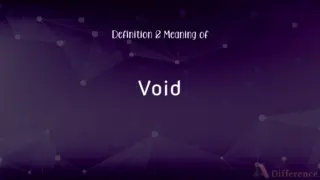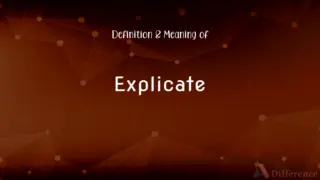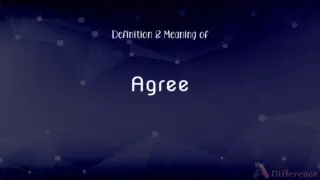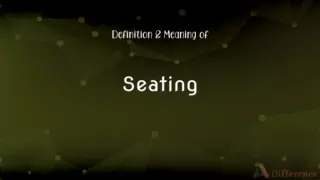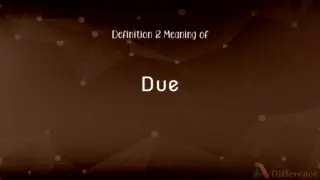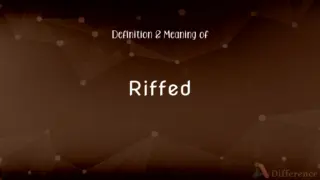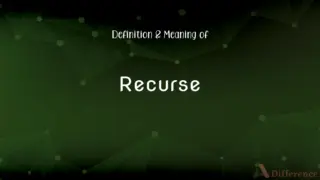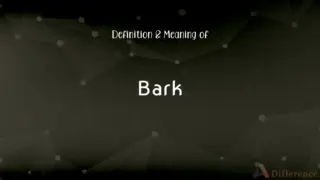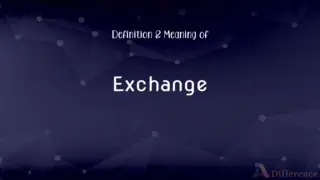Distinguish Definition and Meaning
By Tayyaba Rehman & Urooj Arif — Updated on March 5, 2024
Distinguish means to recognize or treat someone or something as different. e.g., The ability to distinguish colors is important in painting.
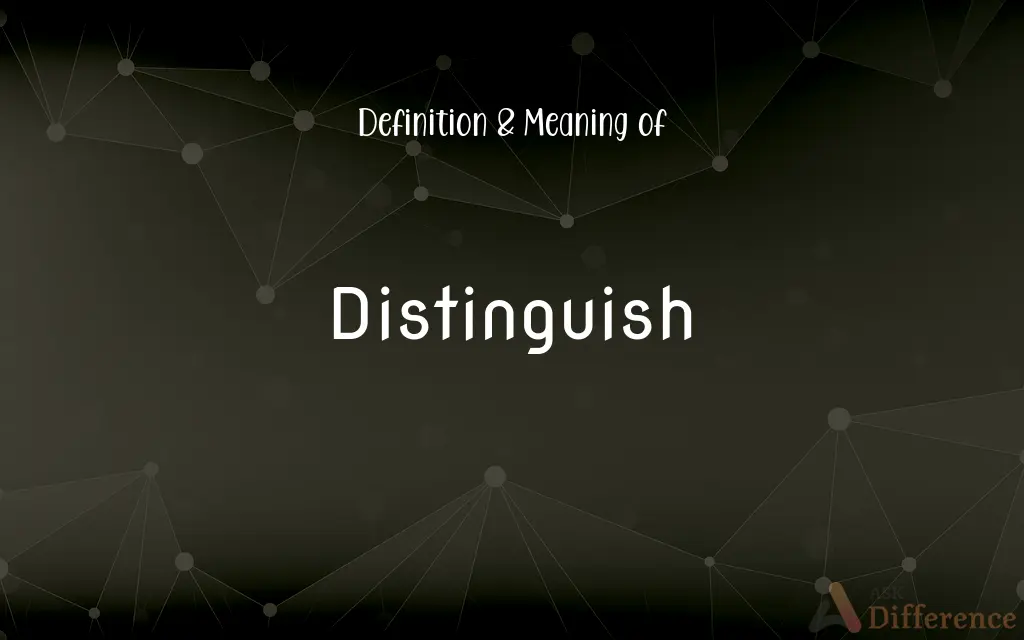
Table of Contents
Distinguish Definitions
To mark as separate or different.
The uniform helps to distinguish firefighters from police officers.
To set apart by unique qualities.
His talent distinguishes him from his peers.
To differentiate between two or more things.
It's hard to distinguish between the twins.
To identify something by specific characteristics.
Biologists distinguish species by their genetic makeup.
To make notable or eminent.
Her research distinguished her in the field of science.
To perceive or point out a difference.
Can you distinguish the difference in taste?
To honor or recognize for excellence.
The award distinguishes outstanding contributions to the arts.
To classify or categorize by type.
The guidebook helps distinguish various kinds of birds.
To perceive as being different or distinct
Can you distinguish a pattern in this behavior?.
To perceive distinctly; discern
The lookout distinguished the masts of ships on the horizon.
To demonstrate or describe as being different or distinct
A scientist who distinguished four species of the plant.
To be an identifying characteristic of; make noticeable or different
These spices distinguish this style of Asian cooking.
To cause (oneself) to be respected or eminent
They have distinguished themselves as dedicated social workers.
To perceive or indicate differences; discriminate
Can the child distinguish between right and wrong?.
To recognize someone or something as different from others based on its characteristics.
To see someone or something clearly or distinctly.
To make oneself noticeably different or better from others through accomplishments.
The soldier distinguished himself in combat and received a medal.
To make to differ.
Not set apart from others by visible marks; to make distinctive or discernible by exhibiting differences; to mark off by some characteristic.
Not more distinguished by her purple vest,Than by the charming features of her face.
Milton has distinguished the sweetbrier and the eglantine.
To separate by definition of terms or logical division of a subject with regard to difference; as, to distinguish sounds into high and low.
Moses distinguished the causes of the flood into those that belong to the heavens, and those that belong to the earth.
To recognize or discern by marks, signs, or characteristic quality or qualities; to know and discriminate (anything) from other things with which it might be confounded; as, to distinguish the sound of a drum.
We are enabled to distinguish good from evil, as well as truth from falsehood.
Nor more can you distinguish of a man,Than of his outward show.
To constitute a difference; to make to differ.
Who distinguisheth thee?
To separate from others by a mark of honor; to make eminent or known; to confer distinction upon; - with by or for.
To make distinctions; to perceive the difference; to exercise discrimination; - with between; as, a judge distinguishes between cases apparently similar, but differing in principle.
To become distinguished or distinctive; to make one's self or itself discernible.
The little embryo . . . first distinguishes into a little knot.
Mark as different;
We distinguish several kinds of maple
Detect with the senses;
The fleeing convicts were picked out of the darkness by the watchful prison guards
I can't make out the faces in this photograph
Be a distinctive feature, attribute, or trait; sometimes in a very positive sense;
His modesty distinguishes him form his peers
Make conspicuous or noteworthy
Identify as in botany or biology, for example
To notice or recognize a difference.
She could distinguish the scent of roses in the garden.
To make oneself noteworthy or exceptional.
He distinguished himself as a leader in the community.
Distinguish Snonyms
Discern
Perceive or recognize (something).
I can discern no difference between the two policies.
Differentiate
Recognize or ascertain what makes (someone or something) different.
Children can differentiate the past from the present.
Recognize
Acknowledge the existence, validity, or legality of.
The law was recognized by the government.
Tell apart
To distinguish between two or more things.
I can tell apart the twins by their voices.
Characterize
Describe the distinctive nature or features of.
The police characterized the incident as a criminal act.
Classify
Arrange (a group of people or things) in classes or categories according to shared qualities or characteristics.
Scientists classify animals into different groups.
Single out
Choose someone or something from a group for special treatment.
She was singled out for her outstanding performance.
Identify
Establish or indicate who or what (someone or something) is.
The star was identified as a supernova.
Separate
Cause to move or be apart.
They separated the good apples from the bad ones.
Discriminate
Recognize a distinction; differentiate.
Babies can discriminate between different facial expressions.
Distinguish Idioms & Phrases
Distinguish from the crowd
To stand out or be noticeably different from the majority.
His unique style of speaking distinguished him from the crowd during the debate.
Distinguish between fact and fiction
To recognize the difference between what is true and what is made up.
A critical reader must learn to distinguish between fact and fiction.
Distinguish oneself
To stand out as exceptional or noteworthy in some capacity.
She distinguished herself early in her career with her innovative research.
Distinguish the subtle differences
To identify the minor or not immediately obvious distinctions.
An expert can distinguish the subtle differences between the two paintings.
Distinguish with honors
To be recognized for exceptional performance, often in an academic setting.
He graduated from the university, distinguished with honors.
Distinguish the nuances
To identify the fine or minor differences in meaning, expression, or sound.
A connoisseur can distinguish the nuances in flavors of fine wines.
Hard to distinguish
Difficult to recognize as different or separate.
The twins were so identical that they were hard to distinguish from one another.
Distinguish by quality
To be recognized or characterized by a high level of excellence or superiority.
The brand has always been distinguished by quality in its products.
Distinguish friend from foe
To recognize who is supportive or friendly and who is hostile or oppositional.
In complex negotiations, it's vital to distinguish friend from foe.
Distinguish for excellence
To be recognized or awarded for outstanding achievements or quality.
The chef was distinguished for excellence in culinary innovation.
Distinguish by feature
To recognize or categorize based on specific characteristics or attributes.
The species is distinguished by features such as its unique markings.
Distinguish on merit
To recognize or judge based on the inherent value or worth of something.
The awards are given to distinguish on merit rather than popularity.
Distinguish the essential from the non-essential
To identify what is crucial or necessary as opposed to what is not important.
Effective time management requires distinguishing the essential from the non-essential.
Distinguish by name
To identify or recognize someone or something based on their name.
Many products in the market can only be distinguished by name due to their similar features.
Distinguish the right from wrong
To discern or make a judgment between ethical and unethical behavior.
It's essential to teach children to distinguish right from wrong at an early age.
Distinguish the truth
To discern or uncover the reality in a situation.
The investigator's job was to distinguish the truth from the web of lies.
Cannot be distinguished
Impossible to recognize as different or distinct.
The copy was so perfect it could not be distinguished from the original.
Distinguish in detail
To provide or recognize specific, detailed differences.
The report must distinguish in detail the project's benefits over its costs.
Distinguish Example Sentences
The guide could distinguish animal tracks in the forest.
The chef can distinguish subtle flavors in dishes.
She learned to distinguish between helpful and harmful plants.
The new technology distinguishes cancer cells more effectively.
Artists distinguish themselves through their unique styles.
The program is designed to distinguish patterns in data.
Children begin to distinguish right from wrong at an early age.
The quality of the fabric distinguishes it from imitations.
The company distinguishes itself with excellent customer service.
He distinguished the error in the calculation immediately.
She could distinguish the bird by its song alone.
The software can distinguish human faces in a crowd.
Her keen eye distinguishes her as a great photographer.
The medal distinguishes acts of bravery.
He aims to distinguish himself in the field of robotics.
Common Curiosities
How do we divide distinguish into syllables?
"Distinguish" is divided into syllables as "dis-ting-guish."
Why is it called distinguish?
It is called "distinguish" because it means to recognize or treat someone or something as different, from the Latin "distinguere," meaning to separate or mark off by differences.
How many syllables are in distinguish?
There are three syllables in "distinguish."
What is the root word of distinguish?
The root word of "distinguish" is from Latin "distinguere."
What is the verb form of distinguish?
"Distinguish" itself is the verb form.
What is a stressed syllable in distinguish?
The stressed syllable in "distinguish" is the second one: "ting."
How is distinguish used in a sentence?
Example: "It's important to distinguish between facts and opinions."
What is the pronunciation of distinguish?
Distinguish is pronounced as /dɪˈstɪŋɡwɪʃ/.
What is the singular form of distinguish?
"Distinguish" does not change form between singular and plural; it remains "distinguish" as a verb.
What is the plural form of distinguish?
"Distinguish" remains the same in plural usage.
What part of speech is distinguish?
"Distinguish" is a verb.
What is another term for distinguish?
Another term for "distinguish" is "differentiate."
Is distinguish a vowel or consonant?
The word "distinguish" starts with a consonant.
Is the distinguish term a metaphor?
"Distinguish" can be used metaphorically in various contexts to imply discernment or recognition.
What is the first form of distinguish?
The first form (present form) of "distinguish" is "distinguish."
Is distinguish an adverb?
No, "distinguish" is not an adverb.
Is distinguish a collective noun?
"Distinguish" is not a noun, so it cannot be a collective noun.
Is the word distinguish imperative?
"Distinguish" can be used in the imperative form, as in "Distinguish the facts from fiction."
Is distinguish a noun or adjective?
"Distinguish" is a verb.
Is distinguish a countable noun?
"Distinguish" is not a noun; it's a verb.
Is the word distinguish Gerund?
The gerund form of "distinguish" is "distinguishing."
Which determiner is used with distinguish?
Determiners are not typically used directly with "distinguish" unless part of a larger noun phrase.
Which vowel is used before distinguish?
The use of a vowel before "distinguish" depends on the context of the sentence.
Which article is used with distinguish?
Articles are not used directly with "distinguish" as it is a verb.
What is the second form of distinguish?
The second form (past simple form) of "distinguish" is "distinguished."
What is the third form of distinguish?
The third form (past participle form) of "distinguish" is "distinguished."
What is the opposite of distinguish?
The opposite of "distinguish" could be "confuse" or "conflate."
Is distinguish an abstract noun?
"Distinguish" is not a noun; it is a verb.
Is distinguish a negative or positive word?
"Distinguish" is neutral; its connotation depends on the context.
Is the word “distinguish” a Direct object or an Indirect object?
"Distinguish" is a verb and therefore does not serve as a direct or indirect object. However, it can take both in sentences.
Which preposition is used with distinguish?
Common prepositions used with "distinguish" include "between" and "from."
Which conjunction is used with distinguish?
Conjunctions like "and," "but," or "or" can be used in complex sentences involving "distinguish."
Share Your Discovery
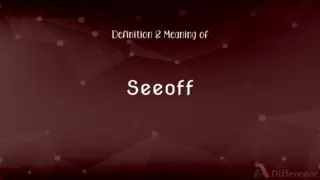
Previous Term
Seeoff Definition and Meaning
Next Term
Exactor Definition and MeaningAuthor Spotlight
Written by
Tayyaba RehmanTayyaba Rehman is a distinguished writer, currently serving as a primary contributor to askdifference.com. As a researcher in semantics and etymology, Tayyaba's passion for the complexity of languages and their distinctions has found a perfect home on the platform. Tayyaba delves into the intricacies of language, distinguishing between commonly confused words and phrases, thereby providing clarity for readers worldwide.
Co-written by
Urooj ArifUrooj is a skilled content writer at Ask Difference, known for her exceptional ability to simplify complex topics into engaging and informative content. With a passion for research and a flair for clear, concise writing, she consistently delivers articles that resonate with our diverse audience.













